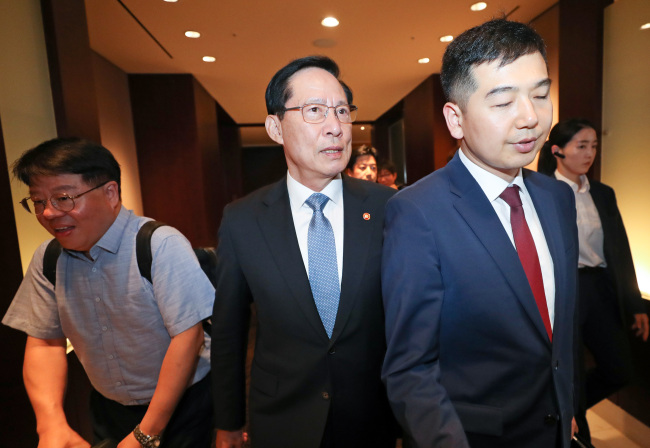Controversy over a martial law document drawn up by the Defense Security Command has escalated into a power struggle between the Defense Ministry and its security command, with the chief of the two organizations blaming each other for the military’s handling of the document.
The DSC suggested that it briefed Defense Minister Song Young-moo on the document “in a serious manner,” but Song delayed reporting the document to the presidential office.
 |
Defense Minister Song Young-moo (Yonhap) |
Song, on the other hand, said that he was never briefed about the document “in detail” by DSC Commander Lt Gen. Lee Suk-koo on March 16. Song said the document was so thick that he did not have a chance to look at it thoroughly.
“I told Lee to leave the document behind because it was so thick,” Song told lawmakers Tuesday. “I was very busy with my schedule on that day. So I managed to look into the document just before I went home.”
President Moon Jae-in has ordered an independent probe into the DSC’s plans for martial law during massive protests against former President Park Geun-hye in March last year.
In the document titled “Wartime Martial Law and Joint Action Plan,” the DSC said it could consider declaring martial law in the event that the Constitutional Court ruled against lawmakers’ decision to impeach Park.
The tit-for-tat between Song and the DSC reached its peak when DSC officers testified that Song downplayed another controversial document designed to invoke a garrison decree to suppress anti-Park demonstrations.
The DSC officers told lawmakers that Song dismissed the seriousness of the document during his meetings with senior officers on July 9, as the defense chief believed the measure described in the document did not constitute a violation of the law.
“I clearly remember what the minister said during the meeting, because it was related to the Defense Security Command. … Having been in uniform for 36 years, I swear on all my honor and conscience as a soldier,” said Col. Min Byeong-sam, chief of the DSC unit under the Defense Ministry.
Song, however, immediately rebutted Min’s remark and dismissed it as an “outright lie.” The minister even accused Min of defaming the defense chief during a televised parliamentary session.
The escalating dispute reflects the ongoing power struggle between the Defense Ministry and DSC, as Song has been pushing for a complete overhaul of the military’s intelligence unit.
Since taking office last year, Song has announced a series of measures to overhaul the DSC by removing its role of carrying out inspections on military officers and secret surveillance on civilians.
“The Defense Security Command has long been considered the most powerful military organization for decades. … I don’t think it would be easy for the DSC to accept the new reality,” said a military official, requesting anonymity due to the sensitivity of the issue.
Designed to monitor military and civilian activities that might jeopardize national security, the command consists of three major branches. In addition to the one in charge of inspecting military officers, the other two oversee counterintelligence operations against North Korea and defense espionage.
Earlier this month, the command became mired in controversy over its alleged surveillance of families of the victims of the Sewol ferry sinking in 2014. The command is suspected of having monitored the families’ daily activities as criticism mounted against the government’s mishandling of the sinking.
By Yeo Jun-suk (
jasonyeo@heraldcorp.com)






![[Herald Interview] 'Trump will use tariffs as first line of defense for American manufacturing'](http://res.heraldm.com/phpwas/restmb_idxmake.php?idx=644&simg=/content/image/2024/11/26/20241126050017_0.jpg)
![[Health and care] Getting cancer young: Why cancer isn’t just an older person’s battle](http://res.heraldm.com/phpwas/restmb_idxmake.php?idx=644&simg=/content/image/2024/11/26/20241126050043_0.jpg)
